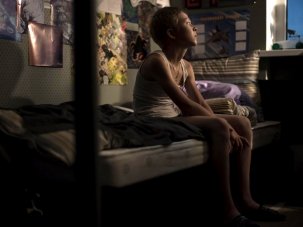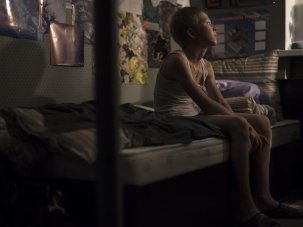
Our March issue goes looking for teenage kicks, as we throw the spotlight onto Greta Gerwig’s fabulous, bittersweet coming-of-age tale Lady Bird. “The essence of the filmmakers I love is that they’re making something that feels very connected to them and could only be made by them,” Gerwig tells Pamela Hutchinson, and for her (solo) debut feature, the Sacramento-raised actor-director has followed that example, with a highly autobiographical story of a Californian high school student nicknamed Lady Bird (played by Saoirse Ronan), who’s desperate to escape her hometown of Sacramento to study on the East Coast, but who finds her roots in the city are far deeper than she could have imagined. “I thought the best way to write a love letter to a place is to frame it with a character who doesn’t love it and wants to leave and doesn’t realise she loves it until it’s in the rearview mirror”, Gerwig tells Hutchinson, and her film rings with the awkward truth and new perspective that comes from looking back after the fact on those joyful, anxious, frustrating and telescoped few years on the cusp of adulthood.
Posted to subscribers and available digitally 5 February
→ Buy a print issue
→ Access the digital edition
→
On UK newsstands 8 February
Among its many acute observations, Lady Bird captures how fickle and painful, but also how vital, friendships are between girls in those teenage years. That subject of female friendship in the movies is one that we explore in another feature this month, published to coincide with a related season at BFI Southbank. As Hannah McGill uncovers, while stories of male friendship are so common that they even have their own genre in the ‘buddy’ movie, depictions of friendships between women or girls remain relatively rare and underappreciated. But there’s a rich tradition there nonetheless, as the BFI season reveals. McGill casts a glance back over the history of the movies to explore how they have portrayed the theme, in films from as wide-ranging a field as Gentlemen Prefer Blondes, The Women and Romy and Michele’s High School Reunion.
Also featured this month is a film that will be challenging Lady Bird for the Best Picture Oscar at the Academy Awards in March – Guillermo del Toro’s sublime romantic fantasy The Shape of Water, a swooningly romantic picture set in in 1950s Baltimore, about a mute named Elisa (played by Sally Hawkins), who works at an aerospace facility operated under the fierce control of an FBI agent played by Michael Shannon, who against all convention falls in love with an amphibian man/creature (with more than a passing resemblance to the creature from the Black Lagoon) that is being held against its will at the facility. In a wide-ranging interview drawn from a masterclass that the famously expansive, erudite and articulate director gave at the Morelia Film Festival in Mexico, del Toro talks to Nick James about the influences on the film, about the magic of fantasy cinema and about his own earliest memories of going to the cinema.
Andrey Zvyagintsev’s haunting Loveless sits in an altogether different cinematic space. A sobering drama set in present-day Russia, about a young boy who goes missing while his parents are in the midst of a bitter separation, it offers a pitiless indictment of a Russian society dangerously preoccupied with superficial distractions. Jonathan Romney talks to the director, and explores how his latest film continues the use of a symbolism-laden style developed over his earlier features.
In fact, Zvyagintsev’s cinema has been seen by many as owing an unmistakable debt to one of the great modernists of world cinema, Ingmar Bergman, so it’s fortuitous that our features section this month also includes a reappraisal of one of Bergman’s most misunderstood – and least-seen – films, The Touch. The English-language film was mostly dismissed on its first release in 1971, and quickly overshadowed by Bergman’s subsequent works, but as the film returns to UK cinemas, and to a new DVD/Blu-ray release, Geoff Andrew argues that it’s high time the film was reassessed and recognised as a major entry in the director’s canon.
Elsewhere in this month’s issue we talk to Sebastián Lelio, the Chilean director of the much-acclaimed A Fantastic Woman, about a trans woman’s struggles against bigotry and ignorance following the death of her lover. We also sit down with Clio Barnard to discuss her latest feature Dark River, a story every bit as dark and grounded as her earlier work. And we publish our full annual Obituaries listings, remembering those form film and TV who left us in 2017, among them Sam Shepard, Peggy Cummins and Mary Tyler Moore.
Our reviews section gathers together the word on all this month’s new releases, including I, Tonya, The Nile Hilton Incident and The Mercy, while our home entertainment section offers a defence of the often derided pleasures of the direct-to-video action flick – currently undergoing a spirited revival through such directors as Isaac Florentine. We take a look at some of the new film books to hit the shelves, including a biography of the almost forgotten founder of Fox Studios, William Fox, and a life of the great – if infamously ‘difficult’ – actor and comedienne Miriam Hopkins.
All this and much more besides…
Features
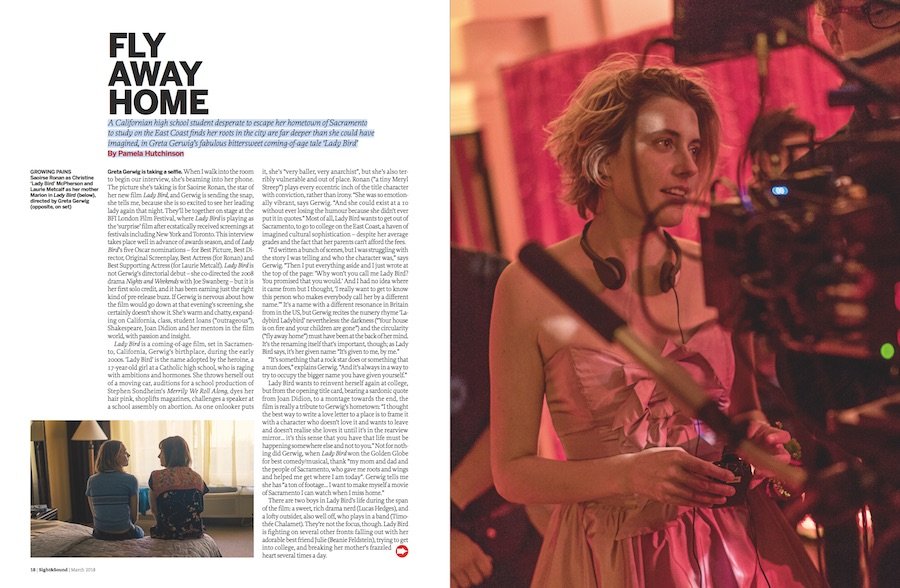
Fly Away Home
A Californian high school student desperate to escape her hometown of Sacramento to study on the East Coast finds her roots in the city are far deeper than she could have imagined, in Greta Gerwig’s fabulous bittersweet coming-of-age tale Lady Bird. By Pamela Hutchinson.
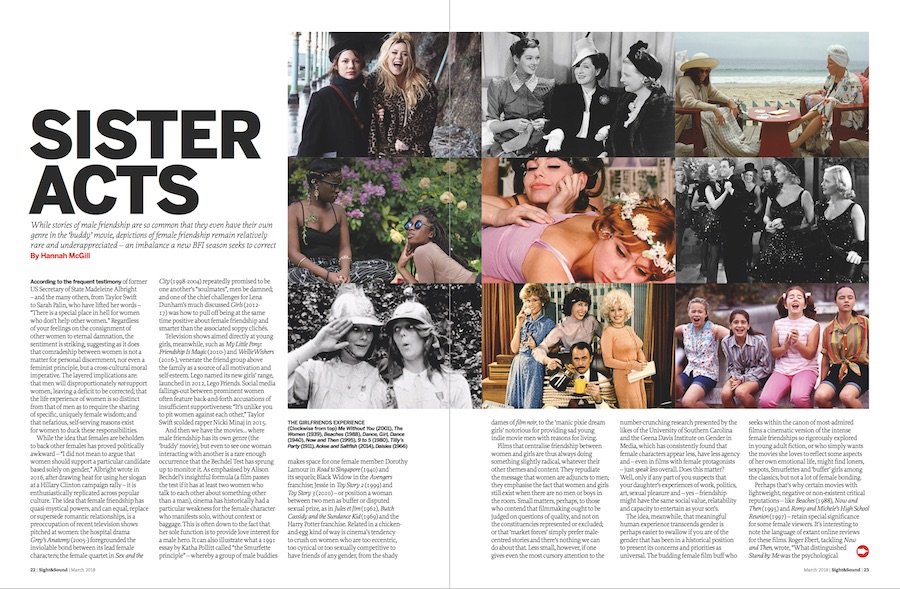
Sister Acts
While stories of male friendship are so common that they even have their own genre in the ‘buddy’ movie, depictions of female friendship remain relatively rare and underappreciated – an imbalance a new BFI season seeks to correct. By Hannah McGill.
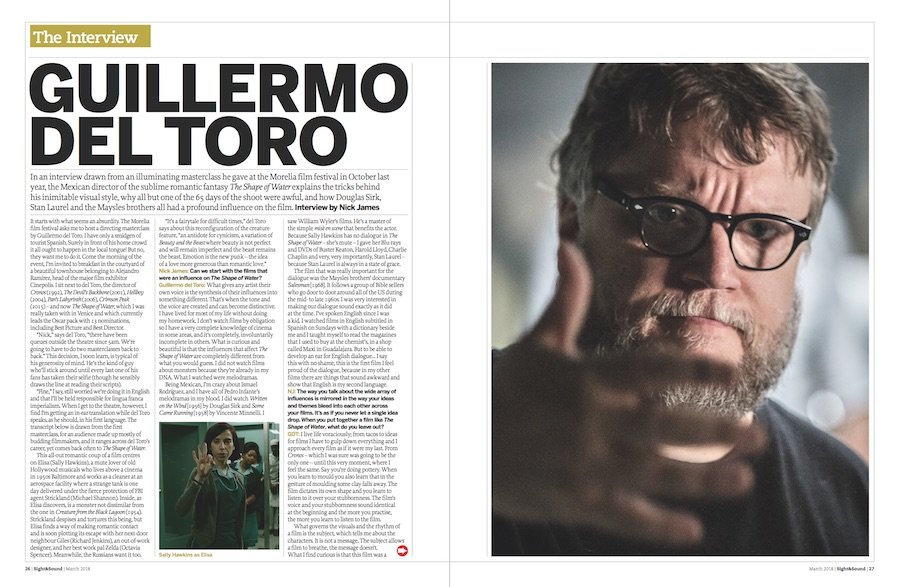
The Interview: Guillermo del Toro
In an interview drawn from an illuminating masterclass he gave at the Morelia film festival in October last year, the Mexican director of the sublime romantic fantasy The Shape of Water explains the tricks behind his inimitable visual style, why all but one of the 65 days of the shoot were awful, and how Douglas Sirk, Stan Laurel and the Maysles brothers all had a profound influence on the film. Interview by Nick James.
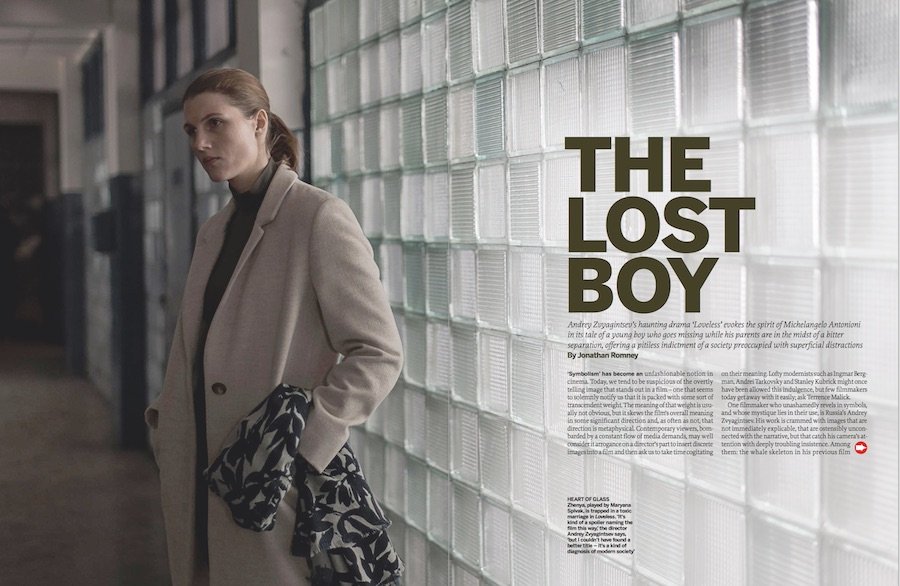
The Lost Boy
Andrey Zvyagintsev’s haunting drama Loveless evokes the spirit of Michelangelo Antonioni in its tale of a young boy who goes missing while his parents are in the midst of a bitter separation, offering a pitiless indictment of a society preoccupied with superficial distractions. By Jonathan Romney.
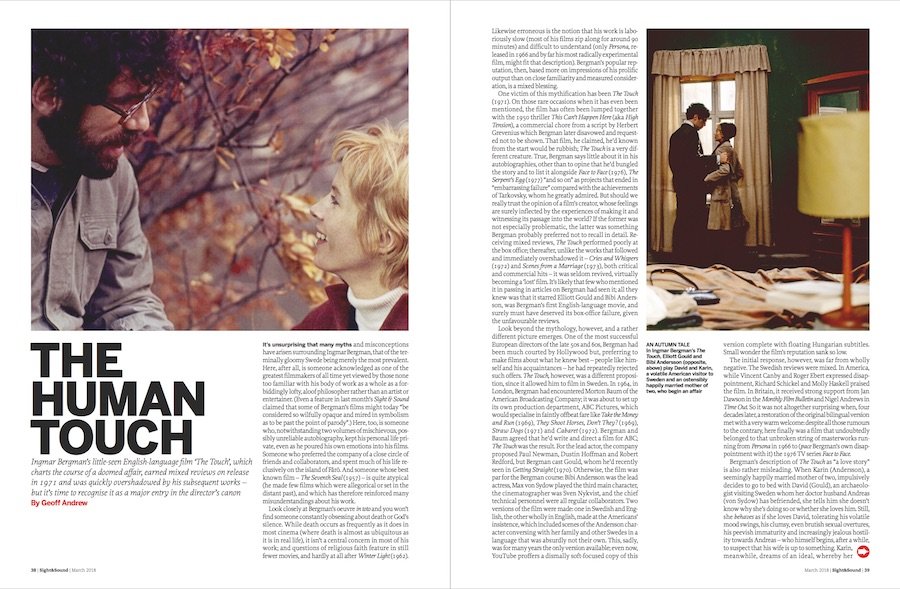
The Human Touch
Ingmar Bergman’s little-seen English-language film The Touch, which charts the course of a doomed affair, earned mixed reviews on release in 1971 and was quickly overshadowed by his subsequent works but it’s time to recognise it as a major entry in the director’s canon. By Geoff Andrew.
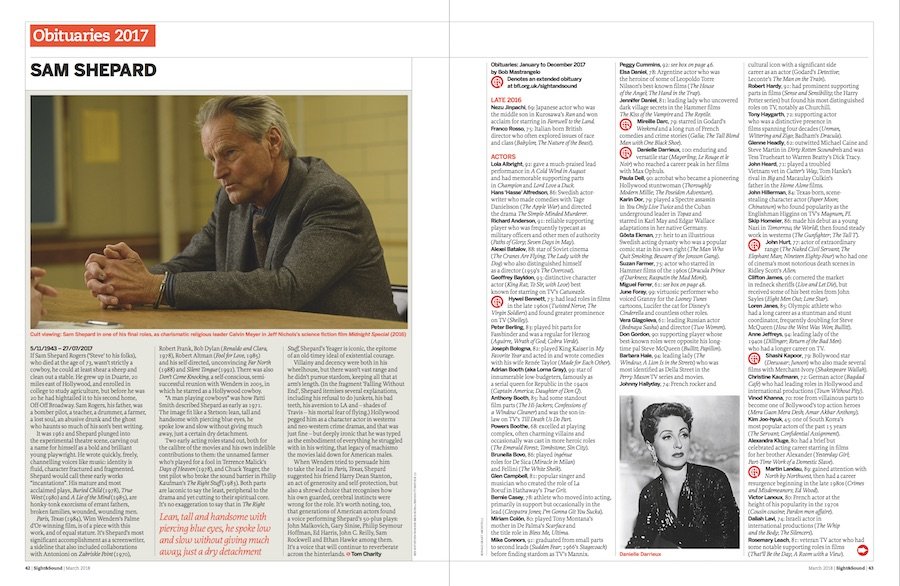
Obituaries 2017
Bob Mastrangelo honours the great and good of the film world who left us in the last year. Plus Tom Charity on Sam Shepard, Kate Stables on Mary Tyler Moore, Jo Botting on Peggy Cummins, Michael Brooke on Károly Makk and Nick Bradshaw on Miguel Ferrer.
Regulars
Editorial
Never mind the symbolics
Rushes
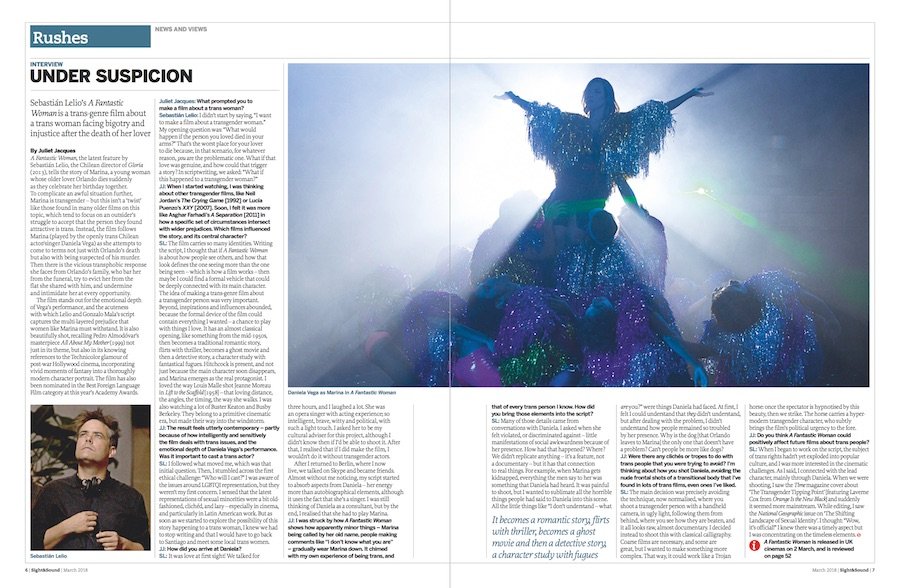
Our Rushes section
Interview: Under suspicion
Sebastián Lelio’s A Fantastic Woman is a trans-genre film about a trans woman facing bigotry and injustice after the death of her lover. By Juliet Jacques.
Industry: Body of proof
The marginalisation of women in film is no secret, but the work of collating precise statistics to prove it offers a powerful agent for change. By Shelley Cobb and Linda Ruth Williams.
The numbers: Oscar contenders
Charles Gant on the 2018 best picture nominees at the US and UK box office.
Interview: Land and freedom
Clio Barnard’s new film Dark River takes her down on the farm, to tell a story every bit as dark and as grounded in reality as her earlier work. By Trevor Johnston.
Dispatches: The age of consent
Choosing whether to engage with a director’s fictional world is a matter of consent, and I no longer want to inhabit Woody Allen’s imagination. By Mark Cousins.
Wide Angle
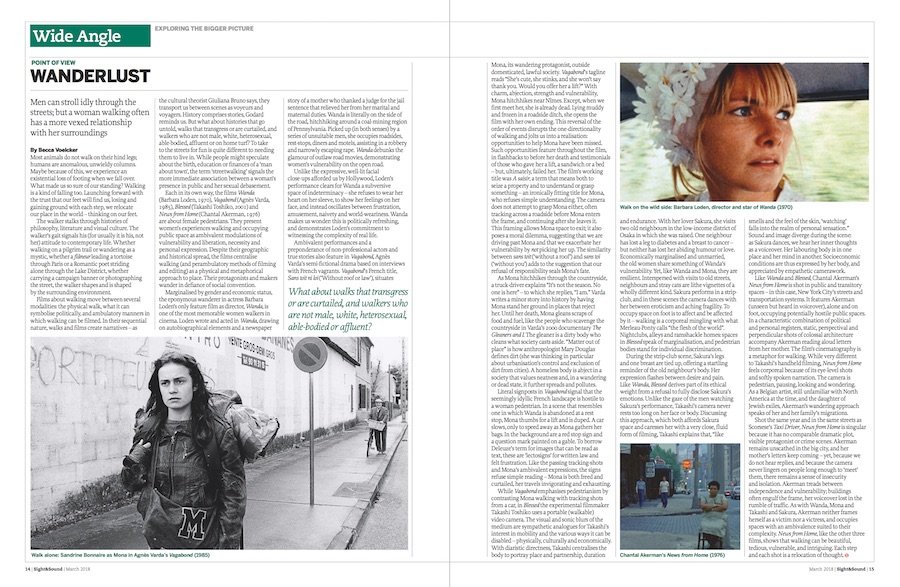
Our Wide Angle section
Point of view: Wanderlust
Men can stroll idly through the streets; but a woman walking often has a more vexed relationship with her surroundings. By Becca Voelcker.
Primal screen: Front loaded
A century after the end of the Great War, the mudbound trench remains an unparalleled image of the futility of armed conflict. By Bryony Dixon.
Artists’ moving image: Material girl
In her short, structurally rigorous, always playful films, Jodie Mack approaches something like why not say it? – perfection. By Nick Pinkerton.
Reviews
Films of the month
A Fantastic Woman
I, Tonya
The Nile Hilton Incident
plus reviews of
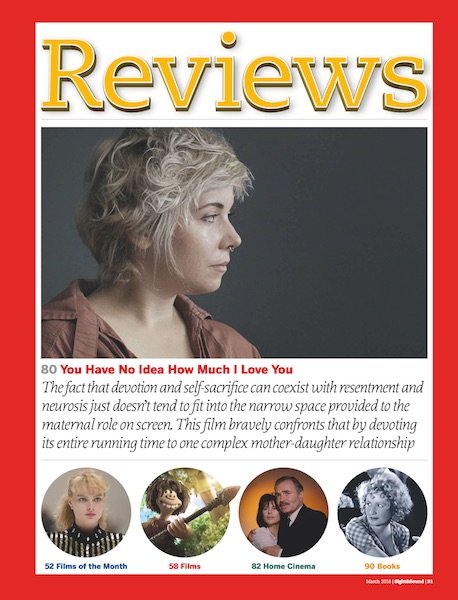
Our Reviews section
All the Money in the World
Attraction
Birth of the Dragon
Bombshell: The Hedy Lamarr Story
The Cinema Travellers
Dark River
Den of Thieves
The Divine Order
Early Man
Erase and Forget
Father Figures
Finding Your Feet
Gook
The Ice King
Insidious: The Last Key
Lady Bird
The Liquidator
Loveless
The Mercy
Mom and Dad
Mukkabaaz
My Life Story
Native
Pitch Perfect 3
Plot 35
The Shape of Water
Slumber
Tokyo Ghoul
The Valley
Wonder Wheel
You Have No Idea How Much I Love You
Home Cinema features
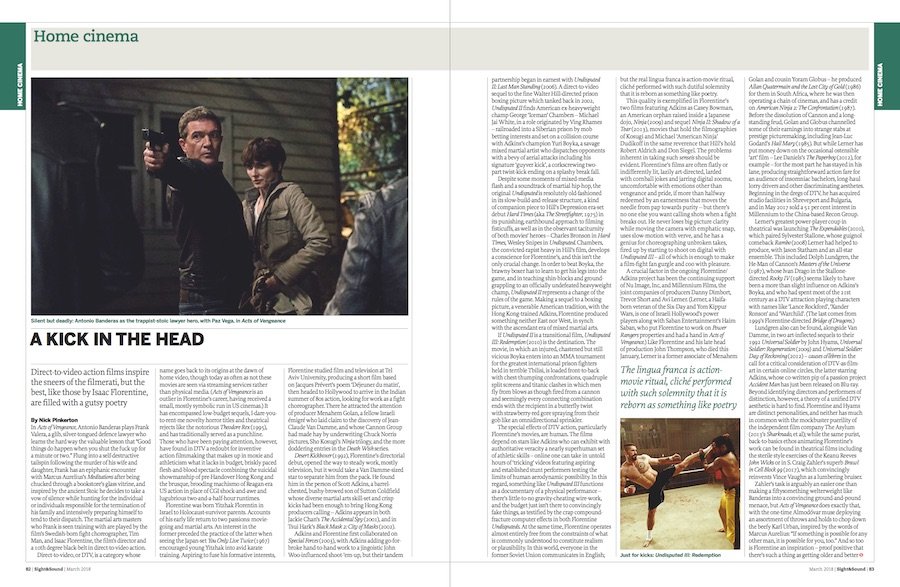
Our Home Cinema section
A kick in the head
Direct-to-video action films inspire the sneers of the filmerati, but the best, like those by Isaac Florentine, are filled with a gutsy poetry. By Nick Pinkerton.
Smoke screen: London Symphony
Alex Barrett’s homage to the city symphonies of the 1920s is a down-to-earth, lyrical appreciation of modern London. By Philip Kemp.
plus reviews of
Alice in the Cities
The Battle of Algiers
Three Films by Jacques Becker
The Border
The Cremator
The Deadly Affair
Seijun Suzuki: The Early Years Vol. 1 – Seijun Rising: The Youth Movies
Viva l’Italia
The Witches
Television
The Nearly Man and The Eagle of the Ninth. Reviewed by Robert Hanks.
Books
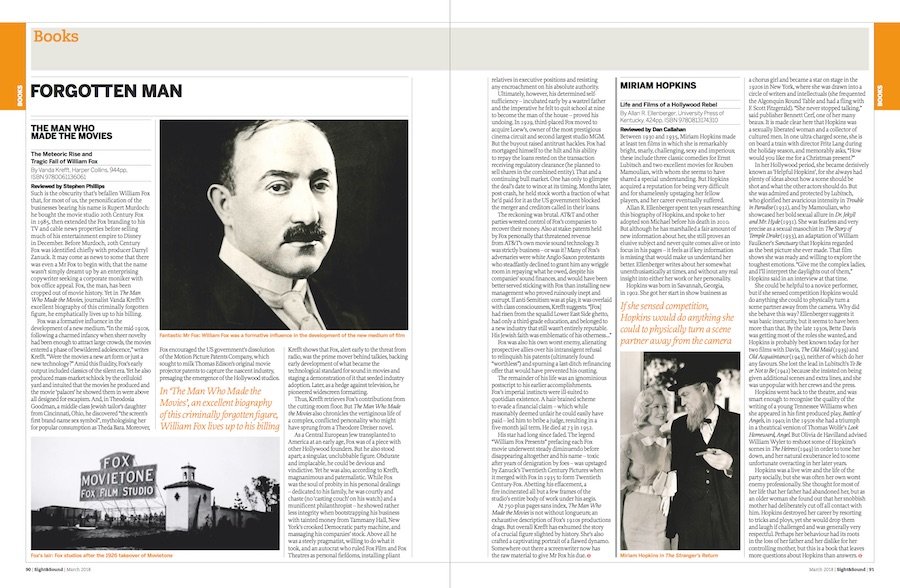
The Man Who Made the Movies: The Meteoric Rise and Tragic Fall of William Fox by Vanda Krefft (Harper Collins) reviewed by Stephen Phillips
Miriam Hopkins: Life and Films of a Hollywood Rebel by Allan R. Ellenberger (University Press of Kentucky) reviewed by Dan Callahan
Cinematic Overtures: How to Read Opening Scenes by Annette Insdorf (Columbia University Press) reviewed by Pamela Hutchinson
Slow Writing: Thom Andersen on Cinema edited by Mark Webber (The Visible Press) reviewed by Nick Bradshaw
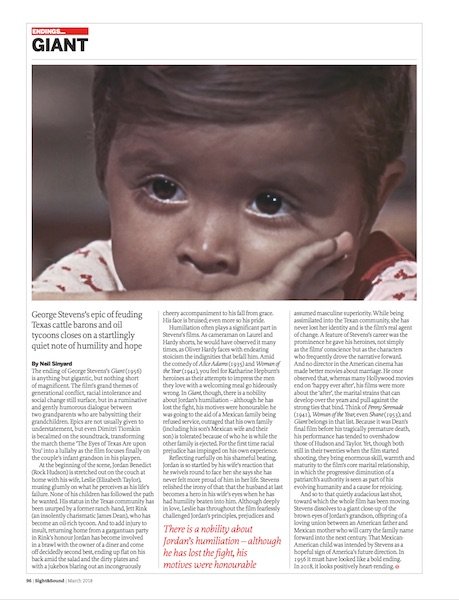
Our Endings section
Letters
Remembrance, ill-remembered
A call for 4K listings
Finding more lost Jacques Rozier films
A post-Revolutionary perspective on Stéphane Brizé’s A Woman’s Life
James Stewart’s non-supporting Best Actor Oscar
Len Collin’s quietly radical direction of Sanctuary
Endings
Giant
George Stevens’s epic of feuding Texas cattle barons and oil tycoons closes on a startlingly quiet note of humility and hope. By Neil Sinyard.
Further reading
-
The Digital Edition and Archive quick link
Log in here to your digital edition and archive subscription, take a look at the packages on offer and buy a subscription.







